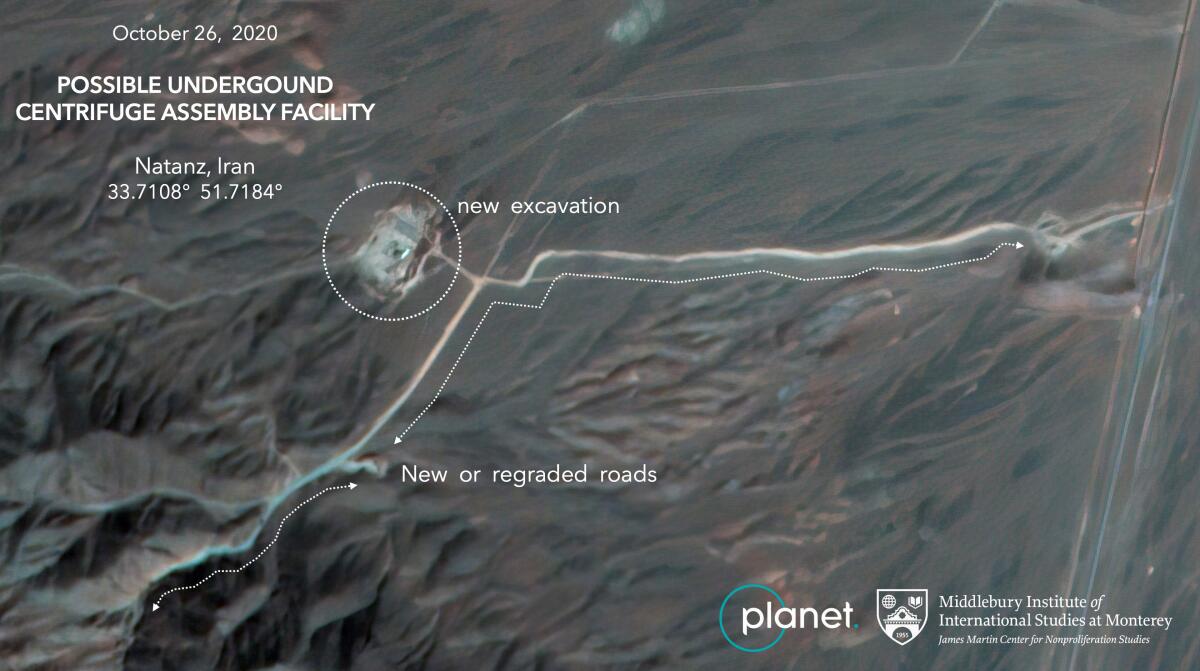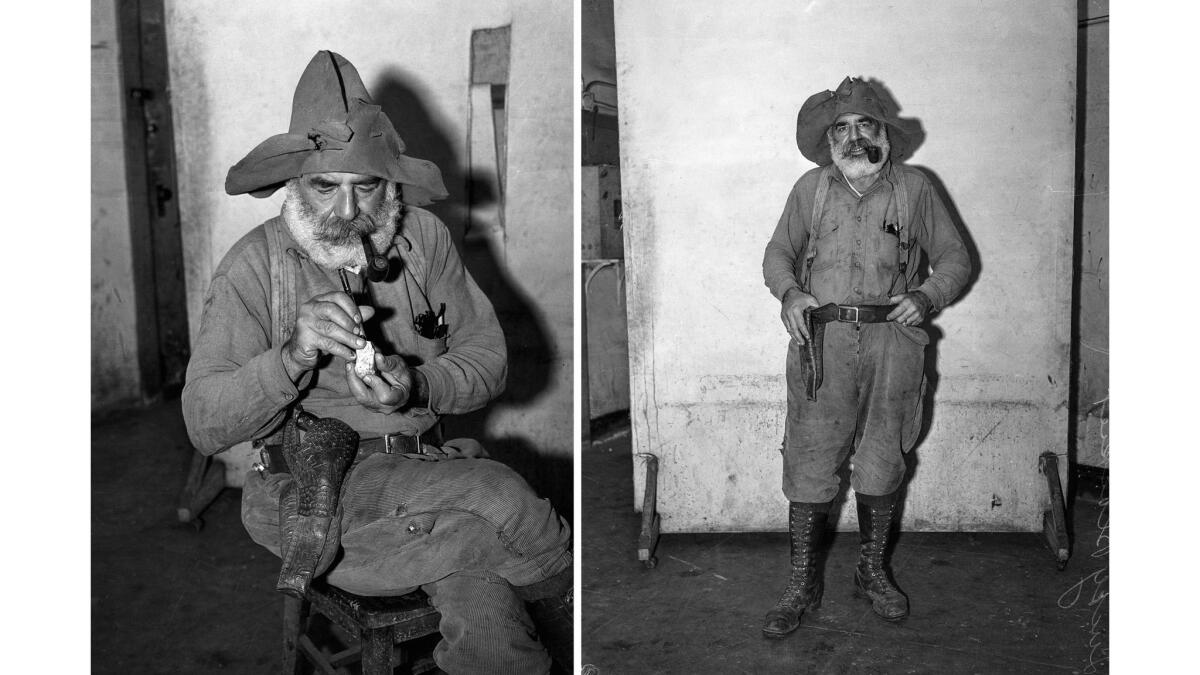Today’s Headlines: Biden’s Iran dilemma

As talks to revive the Iran nuclear deal begin in earnest this week, there are no easy options.
TOP STORIES
Biden’s Iran Dilemma
With the first serious efforts to revive the Iran nuclear deal unfolding this week, President Biden faces an increasingly urgent dilemma: He can go slow, risking war and a collapse of talks, or move fast, even if it means a possibly flawed deal that damages his ambitious domestic agenda.
Iran, the U.S., the European Union and the five other nations that signed the 2015 nuclear pact, including China and Russia, will gather in Vienna starting Tuesday in hopes of salvaging an agreement that the Trump administration attempted to “rip up” but that other world powers struggled to keep alive.
Start your day right
Sign up for Essential California for the L.A. Times biggest news, features and recommendations in your inbox six days a week.
You may occasionally receive promotional content from the Los Angeles Times.
The new talks — the first public meetings involving all parties since former President Trump withdrew from the deal in 2018 — are aimed at returning the U.S. and Tehran into compliance.
But technical and, more important, political challenges remain for all parties. Recent attacks by Iranian proxies on U.S. forces in Iraq are making it tougher for the Biden administration to build domestic support, and many Republicans remain opposed to a return to the deal.
‘It’s an Educational Pandemic’
More than 1.1 million students in California, nearly 20%, are considered English learners.
By almost every measure of academic success — graduation rates, college preparation, dropout rates, state standards — these students rank among the lowest-achieving groups. And that was before pandemic-forced campus closures.
One year later, this massive population of students is at great risk of intractable educational loss, experts said. Solutions put forward include improving distance learning and extending the school year and school days to allow for additional learning time. Even with interventions now, the effects could last for years.
Sign up for 8 to 3, a new newsletter about school, kids and parenting from the Los Angeles Times.
More Top Coronavirus Headlines
— From living rooms to parking lots to chapels with masked, socially distanced worshipers, Southern California’s Black churches celebrated their second pandemic Easter.
— What appears to be a fourth wave of the COVID-19 pandemic has struck Michigan, the New York region and New England, and experts are uncertain if it will remain contained.
— L.A. County moves into the orange tier today. Here’s what will change, including the reopening of bars without food service.
— After a difficult year of pandemic-accelerated enrollment losses and hobbled fundraising, six elementary schools in the Roman Catholic Archdiocese of Los Angeles will close in June.
A New Flashpoint in L.A.’s Homeless Crisis
One week ago, 31-year-old Gabriel “Gabe” Donnay was killed in his own backyard in Beverly Grove, where he was stabbed by an intruder who police said was living out of his car and who neighbors had reported hopping fences before the attack.
At a time of intense frustration around L.A.’s homelessness crisis, Donnay’s death has become a particularly emotional flashpoint. Family, friends and neighbors say change must come.
But what form that change takes is a matter of debate.
OUR MUST-READS FROM THE WEEKEND
— “How can I get him from there?” Young migrants are stuck in the Border Patrol backlog.
— Formerly homeless artist Terrance Whitten made a gift to Los Angeles. What happened next was a surprise.
— What became of the homeless people booted from Echo Park? Columnist Erika D. Smith caught up with some of them.
— Wine tasting in Napa and Sonoma will never be the same. Here’s why that’s a good thing.
FROM THE ARCHIVES
“Lucky” Blackiet was one of those characters who sporadically appeared in the pages of the Los Angeles Times in the 1930s.
The photo below left accompanied a short story on Blackiet in the April 6, 1934, Times:
“A broken pair of buggy wheels accounted for the visit to Los Angeles yesterday of ‘Lucky’ Blackiet, 79 years of age and hale and hearty after a lifetime spent prospecting the West from lower California to Alaska.
“Blackiet, who says he has made and lost eight fortunes, one of them amounting to $5,000,000, will be on his way again as soon as he gets his wheels and, once on his way, ‘try and find me.’”
There’s more to Lucky’s story.

CALIFORNIA
— Gov. Gavin Newsom called for a ban on hydraulic fracturing by oil and gas companies last year, but he may get more than he bargained for under a plan being considered in the Legislature.
— San Diego County has prohibited the region’s 18 tribes from expanding their reservations for more than two decades. That ban could soon be lifted.
— Fashion designer J. Mossimo Giannulli, who pleaded guilty in the college admissions bribery scandal, has been released from a California prison and is under home confinement, according to a person familiar with the matter.
— The Ralphs supermarket in L.A.’s Pico-Robertson neighborhood is popular in the Jewish community for its extensive kosher selections. The store is set to close after a city-mandated “hero pay” ordinance for grocery workers.
Support our journalism
Subscribe to the Los Angeles Times.
NATION-WORLD
— The man who rammed a car into two officers at a barricade outside the U.S. Capitol, killing one of them before he was shot to death by police, had been suffering from delusions, paranoia and suicidal thoughts, a U.S. official told the Associated Press.
— Crews were working to prevent the collapse of a large wastewater pond in the Tampa Bay vicinity while evacuating the area to avoid a “catastrophic flood,” Florida Gov. Ron DeSantis said.
— Hours after being confined to his home by military officials, Jordan’s popular former crown prince issued a scathing broadside against the longtime rule of King Abdullah II, blaming the government for corruption and incompetence.
— The owner of a construction truck that caused Taiwan’s worst rail accident in decades, killing 48 people, apologized in tears while being led away from his home by police.
HOLLYWOOD AND THE ARTS
— “The Trial of the Chicago 7” won the big film prize at the Screen Actors Guild Awards. That will add some intrigue at the Academy Awards, as columnist Glenn Whipp explains.
— “Godzilla vs. Kong” set a pandemic record for a Hollywood film in international markets; its North American release also hints at a forthcoming return to the box office.
— Actor Mary Steenburgen has a story about seemingly everyone in Hollywood. And she’s not done talking.
— “The Nevers” is HBO’s next great fantasy series, TV critic Lorraine Ali writes.
BUSINESS
— The personal data of more than half a billion Facebook users reemerged online for free Saturday, a reminder of the company’s ability to collect mountains of information and its struggles to protect these sensitive assets.
— Scam victims may feel stupid and ashamed. And that’s perfectly normal, consumer columnist David Lazarus writes.
SPORTS
— How big was the stunning ending of Gonzaga’s overtime victory against UCLA in the NCAA men’s basketball tournament? CBS announcer Jim Nantz sees it as this generation’s Laettner moment.
— In the NCAA women’s basketball tournament, Stanford defeated Arizona to win its first title since 1992.
Free online games
Get our free daily crossword puzzle, sudoku, word search and arcade games in our new game center at latimes.com/games.
OPINION
— It’s time to get the wrecking ball ready for the Men’s Central Jail in L.A. County, The Times’ editorial board writes. It’s a decrepit and dangerous place that generally leaves people in even worse shape on their way out.
— A Nepali doctor is treating the biology, and the sociology, behind mental illness. That has lessons for us all, writes professor Roy Richard Grinker.
WHAT OUR EDITORS ARE READING
— Yield-chasing investors are snapping up single-family homes, competing with ordinary Americans and driving up prices. (Wall Street Journal)
— Thoughts on letter writing’s pleasures in an “era of impulsive interaction,” from novelist Jackie Polzin. (Literary Hub)
ONLY IN L.A.
Performance artist and comedian Kristina Wong didn’t set out to start a movement, mobilize the masses, spend the last year searching out under-resourced communities and commandeering fabric and elastic to give away thousands of COVID-19 face masks. As columnist Nita Lelyveld writes, it all began when she found herself stuck in her Koreatown apartment, watching her life’s plans implode.
Comments or ideas? Email us at headlines@latimes.com.
Start your day right
Sign up for Essential California for news, features and recommendations from the L.A. Times and beyond in your inbox six days a week.
You may occasionally receive promotional content from the Los Angeles Times.



